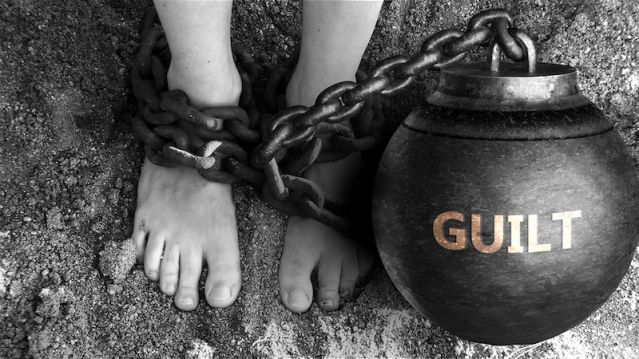Guilt
Emotional Neglect and Toxic Guilt: An Unpleasant Pair
Guilt is built into the effects of emotional neglect, and it can become toxic.
Posted June 6, 2023 Reviewed by Michelle Quirk
Key points
- Guilt is rooted in the belief system. If you believe feelings are bad, you may feel guilty for having them.
- People with emotional neglect can feel guilty for speaking up, asking for help, or having needs.
- Reinterpreting our guilt while putting it in its place can help us overcome it and move forward to heal.

Joanna is sleep deprived, overworked, and exhausted. The word “no” doesn’t exist in her vocabulary. She agrees to take on task after task at work, in her friend group, and within her family. On the weekends, she sometimes has multiple events to attend in one day—a friend’s baby shower that she’s hosting, her nephew’s birthday party (she’s in charge of bringing her famous homemade cheesecake), and volunteer work for her company. Joanna knows she has too much on her plate, but the thought of saying no to people who count on her creates paralyzing feelings of guilt that she is not doing enough. "I should be doing that," reverberates through her head on a daily basis.
Omar lives with his wife and two small children a few hours away from his parents and siblings. He feels fulfilled in his work and enjoys being the stand-up guy and family man that he is. But, every time he talks to his parents on the phone or can’t make the long drive for a get-together, he is absorbed by feelings of guilt. He feels bad for not living close to them. It’s when he’s enjoying his independence and the life he’s created for himself that Omar begins to feel selfish and guilty.
What Joanna and Omar have in common is that they are suffering the repercussions of childhood emotional neglect. Childhood emotional neglect happens when your parents fail to meet your emotional needs as they raise you. Your feelings are treated as though they don’t exist—invisible, unwelcome, or irrelevant. When you learn, as a child, to treat your feelings as an inconvenience, you consequently begin to ignore, suppress, and hide your emotions from yourself and others.
Now, as an adult, you end up living in an emotional world without full access to your feelings or emotional needs. Living a life free from emotional awareness has its challenges. One challenge, in particular, is too much of one particular emotion. It’s an emotion that inevitably feels familiar and burdensome. It’s an emotion that halts you in your tracks. It interferes with your ability to make positive changes and forces you back into the emotionally unattuned abyss. It’s guilt.
Childhood Emotional Neglect and Toxic Guilt: An Unpleasant Pair
- Growing up in an environment that sends you the message (directly or indirectly) that your feelings don’t matter sets you up to believe that even having feelings is selfish. The emotionally neglected are extremely fearful of being selfish, just as you saw with Omar. And, so, guilt rears its head when there's an inkling of selfishness, which is often.
- To separate from your parents, it’s necessary for you to prioritize your feelings and needs over theirs. It’s also necessary for you to say “no,” set boundaries, and use your emotions as your guide to becoming your own person. Unfortunately, the emotionally neglected have difficulty with these necessary tasks, and guilt pops up, preventing them from making independent decisions.
- Guilt is the feeling that you did something wrong or bad. The interesting thing about guilt is that it’s typically attached to your belief system. If you believe having feelings is wrong or bad, you might see how guilt would be a predominant emotion. Guilt holds you back, keeping you stuck in old ways of thinking and behaving.
- People who feel guilty the most are usually the people who have the least reason to feel guilty. The emotionally neglected tend to question themselves and care greatly about others, many times to a fault. They’re overly concerned about others and want to do “the right thing,” sometimes trapping them in their guilty feelings. This is the sad reality for Joanna, as described above.
3 Things to Practice to Heal Your Emotional Neglect and Guilt
- Pay attention to your feelings and emotional needs. If guilt is present, you can begin to understand it differently: as a message from your body telling you that you need to change. Your body is sending you this message as it tries to protect you, but the signals have gone awry. It's not you who has done something wrong; it's your childhood that did something wrong. When you reinterpret your guilt, you can use it as a driver toward change. You can begin working on identifying your feelings and needs separate from your guilt, the very process of healing your childhood emotional neglect.
- Express your feelings, needs, desires, and wishes to others. Learning and practicing the emotion skills is a part of childhood emotional neglect recovery. Guilt will be present during this process. Remember, you may experience many of these essential skills as being selfish— incorrectly, of course. But keep on practicing the skills despite the guilty feelings.
- Interact differently with people in your life. Begin expressing your feelings to your partner and children, practice setting firmer limits with your parents, and start asking for help from friends. You might receive backlash or confused reactions since your loved ones may not be accustomed to these kinds of interactions with you, and guilt may come rolling in. Don’t let that stop you.
You Are in Control of Your Guilt
Healing from childhood emotional neglect isn’t a linear process. It’s when guilt presents itself that your lows may feel stronger and more difficult to overcome. But your guilt doesn’t have to win. You are the one that’s in control.
Do you see yourself in Joanna's and Omar’s stories? Start becoming aware of your guilt and its origins in your childhood emotional neglect. Understand that your guilt can be a sign that you have an opportunity to change patterns in your life. Remember that getting in touch with your feelings, prioritizing your needs, and advocating for yourself is something to feel proud of. There's no room for guilt there at all.
© Jonice Webb, Ph.D.
References
To determine if you might be living with the effects of childhood emotional neglect, you can take the free Emotional Neglect Questionnaire. You'll find the link in my Bio.


